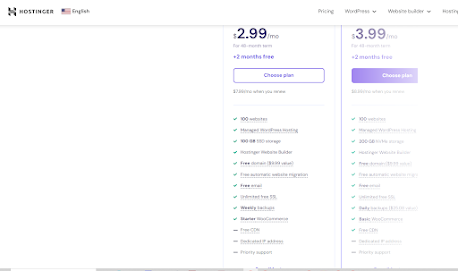Between Hostinger and Bluehost, both are solid choices, but they have some key differences in terms of cost, performance, and long-term benefits. Here’s a breakdown to help you decide which is more cost-effective for your needs:
1. Initial Cost and Setup
- Price: Hostinger is generally cheaper, with initial plans starting around $2.99/month for shared hosting.
- Initial Discounts: Hostinger often offers steep discounts for first-time buyers, making it an appealing low-cost option to get started.
- Setup: Hostinger’s interface is user-friendly but not as integrated with WordPress as Bluehost.
- Features: Includes a free domain (for the first year), SSL certificate, and SSD storage. It’s a budget-friendly option for a starter affiliate site.
-
- Price: Bluehost’s initial pricing starts at $3.95/month (with discounts for the first year), making it slightly more expensive than Hostinger in the beginning.
- Initial Discounts: Bluehost also provides good first-time discounts, but it’s still slightly higher than Hostinger.
- Setup: Bluehost is officially recommended by WordPress, which means the integration and setup process is seamless, especially if you're using WordPress.
- Features: Includes a free domain (for the first year), SSL certificate, CDN, and 24/7 support. It is highly optimized for WordPress hosting.

2. Performance and Reliability
Hostinger:
- Performance: Hostinger offers good performance for the price. It uses LiteSpeed web servers that deliver fast load times, which is a major plus for affiliate marketing sites that rely on fast browsing.
- Uptime: Hostinger claims 99.9% uptime, and their performance is solid overall, though not as robust as Bluehost for handling traffic spikes.
- Server Location: Hostinger has multiple server locations worldwide, which helps improve load times globally.
Bluehost:
- Performance: Bluehost has better performance and more consistent uptime. It also provides better scalability for when your site traffic grows, making it a solid long-term choice.
- Uptime: Bluehost also claims 99.9% uptime, and its infrastructure is more suited to handling higher traffic.
- Server Location: Bluehost only has servers in the US, which may affect performance if your traffic is global.
3. Long-Term Cost and Renewal Fees
Hostinger:
- Renewal Cost: After the initial discounted period, Hostinger’s prices go up significantly, usually starting at $5.99 to $9.99/month depending on the plan.
- Shifting Cost: Hostinger offers affordable VPS or Cloud hosting options for future upgrades, so scaling up won’t break the bank.
- Long-Term Value: Hostinger’s plans are more affordable for the first few years but may not have the same longevity in terms of performance if your traffic increases significantly.
Bluehost:
- Renewal Cost: Bluehost’s renewal rates start around $8.99 to $11.99/month, which is higher than Hostinger but offers more features and better performance as your site grows.
- Shifting Cost: Bluehost is great for long-term growth, as upgrading to VPS or Dedicated Hosting is smoother and supported better compared to Hostinger.
- Long-Term Value: Bluehost’s slightly higher renewal costs are justified by its better performance, customer support, and integration, making it a better option for sites that are expected to grow.
4. Support and Resources
Hostinger:
- Support: Hostinger offers 24/7 live chat support, which is quite responsive, but it doesn’t offer phone support like Bluehost.
- Resources: Hostinger provides decent tutorials and knowledge base articles, but it doesn’t have as much depth as Bluehost when it comes to WordPress-specific support.
Bluehost:
- Support: Bluehost offers 24/7 customer support via live chat and phone. Their WordPress-specific support is excellent, which is a major plus if you’re using WordPress for your affiliate site.
- Resources: Bluehost has an extensive set of WordPress tutorials, helping you through every step of setting up your site, optimizing it, and managing growth.
5. SEO, Performance, and Outcomes
- Hostinger:
- Hostinger offers solid SEO tools and performance for basic affiliate websites. However, if you plan to scale your site significantly, you might find its performance slightly lacking, especially for traffic-heavy pages.
- Bluehost:
- Bluehost integrates well with SEO plugins like Yoast and provides faster load times for heavier affiliate sites. If you’re planning on growing your site and focusing heavily on SEO, Bluehost provides more reliable long-term performance.
Conclusion: Which Should You Choose?
If Budget is Your Priority (Low-Cost, Starter Site):
- Hostinger is more cost-effective initially, and it’s great if you’re looking to minimize upfront expenses. It’s a solid option if you don’t expect massive traffic in the short term but want to keep costs low while building up your affiliate site.
If You Plan for Long-Term Growth and Better Performance:
- Bluehost is a better investment if you plan to scale your website and expect significant traffic growth over time. Though it’s slightly more expensive, its performance, ease of use, and support justify the cost, especially for long-term success in affiliate marketing.
For your affiliate website’s initial launch and future growth, Bluehost would provide a more reliable foundation in the long run, while Hostinger is better for a low-budget start with room to grow later.





get a special discount😀 on Bluehost with following 🟢link
ReplyDeletehttps://referral.bluehost.com/shazaibdilawar7!962637b18f!a
special discount😀 on Bluehost with link
ReplyDeletehttps://referral.bluehost.com/shazaibdilawar7!962637b18f!a